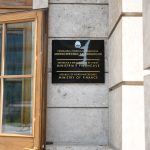13th May 2025, Brussels – execution of the new Organic Budget Law in its entirety and implementation of prudent fiscal policy by adopting specific measures aimed at fiscal consolidation, deficit reduction, and enhanced Budget revenue collection efficiency, are part of the recommendations for the Republic of North Macedonia, as outlined in the Joint Conclusions of this year’s 11th Economic and Financial Dialogue between the EU and the EU candidate countries, whereat Minister of Finance, Gordana Dimitrieska-Kochoska took part.
„Adopted Joint Conclusions within the Economic and Financial Dialogue, which relate to strengthening fiscal governance, capital investment implementation, enhancing the operational capacities the tax administration, and monitoring fiscal risks, are aligned with the reforms outlined both in the Reform Agenda and the Public Finance Management Reform Program, Minister of Finance stated.
She went on that amidst such global economic instability, fiscal policy should counter uncertainties in global and domestic landscape. Thereby, she further emphasized that, given the limited fiscal space resulting from the successive crises, fiscal policy is confronted with the challenge of attaining fiscal consolidation, while also supporting growth-friendly initiatives.
„In times of geopolitical upheaval and trade wars, we need to allow our companies to develop by creating a dynamic business environment that will fully unleash their potential for growth. What is important for the private sector is the willingness of our Governments to provide for quality tax care, quality of infrastructure, available and skilled labour force, affordable energy, lessened administrative burden and legal environment favourable to regional supply linkages. “What we, as policymakers and decision-makers, need to consider and determine, is the manner of creating a dynamic business environment, which will allow for our companies to swiftly accommodate to the current steep competition on the global market,” Minister of Finance stated.
To that end, she stressed that the Government is committed to carrying out transformative reforms in our country, focused on digital transformation, sustainable energy transition, strengthening human capital, enhancing the rule of law, and improving public finance management, key areas in the focus of the country’s Reform Agenda.
According to the participants, the Economic and Financial Dialogue will continue to play a significant role in accomplishing the broader goals as regards good governance and economic prosperity. They agreed that the Dialogue should maintain its central role in setting common policy guidelines in support of sustainable medium-term economic growth and gradual alignment with the economic accession criteria. The participants emphasized that the implementation of the joint conclusions, as well as the economic reform programs and the reform agendas, play a crucial role in making the desired progress.
Discussions held at this year’s 11th Economic and Financial Dialogue, were focused on the European competitiveness in the light of the ongoing geopolitical developments and the need for the legal framework streamlining for the purpose of reducing the administrative burden on companies. In order for the economy to generate growth and create jobs amidst a trade war, companies should be provided with the opportunity to boost their competitiveness through investments and innovation.
This year’s Economic and Financial Dialogue in Brussels will be attended by finance ministers from the current and the two successive Presidencies of the Council of the European Union, representatives of the EU Member States, the European Commission, the European Central Bank, the European Investment Bank, as well as the Ministers of Finance and the Central Bank Governors from the Western Balkan countries, Türkiye, Georgia, Moldova and Ukraine.
















